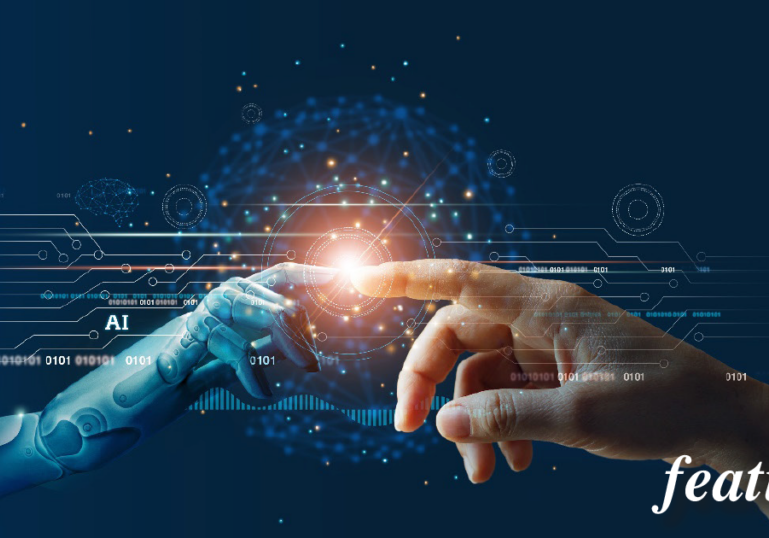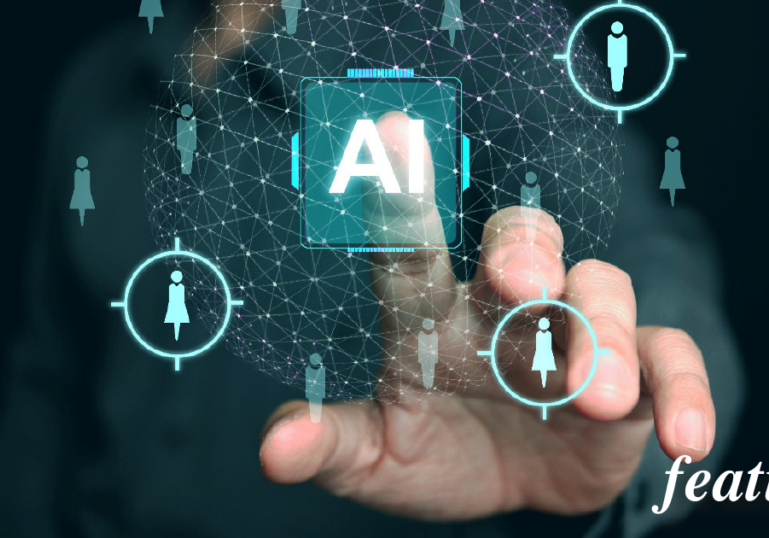Generative AI (GenAI) transforms industries and functions by boosting productivity quality and improving efficiency. Despite widespread enthusiasm, HR professionals are still cautious of these technologies’value and application.1 Our eighteen-month research, surveying over 1,500 HR professionals, reveals four distinct HR personas, each facing unique opportunities and challenges in adopting and leveraging AI. This article explores the present state of AI adoption and the barriers faced within HR. It outlines the four adoption personas and presents critical priorities for HR leaders to effectively leverage AI for future success.
Introduction
Generative AI (GenAI) is revolutionizing industries by significantly enhancing productivity, quality, and efficiency. Tools like ChatGPT, Microsoft Co-pilot, and DALL-E have surged in popularity, surpassing even mobile phones and earlier digital innovations in their adoption rates. 2
Despite the enthusiasm, HR professionals are cautious and skeptical about these technologies’ value and application. Our research surveyed over 1,500 HR professionals over eighteen months and identified four distinct HR personas, each with unique opportunities and challenges in harnessing AI’s potential.
In this article, we delve into the current reality of AI adoption in HR, the four personas shaping AI adoption, and the critical priorities for HR leaders to effectively leverage AI for future success.
The Current Reality of AI Adoption in HR
Based on our research, over half (51%) of HR professionals rely on AI tools daily. This growing dependence on AI for tasks like automating administrative duties, scheduling interviews, and managing employee inquiries through chatbots has streamlined operations, saving time and boosting efficiency. 3 The overall sentiment towards AI in HR is also optimistic, with 80% of HR professionals recognizing its potential benefits in streamlining operations, enhancing decision-making, and improving employee experiences.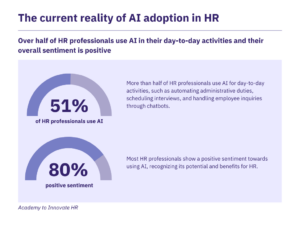 Yet, while these practical applications are valuable, there’s significant room for improvement in integrating AI into more complex HR processes.4 Despite the rise of AI in HR, its use cases often need more clarity and substantial impact. Recruitment and talent acquisition has seen the most notable AI adoption, with 49% of HR professionals leveraging AI in these practices. However, this trend is primarily vendor-driven, with most HR departments using AI reactively rather than embedding it into strategic functions like talent management, performance evaluation, and employee development.5
Yet, while these practical applications are valuable, there’s significant room for improvement in integrating AI into more complex HR processes.4 Despite the rise of AI in HR, its use cases often need more clarity and substantial impact. Recruitment and talent acquisition has seen the most notable AI adoption, with 49% of HR professionals leveraging AI in these practices. However, this trend is primarily vendor-driven, with most HR departments using AI reactively rather than embedding it into strategic functions like talent management, performance evaluation, and employee development.5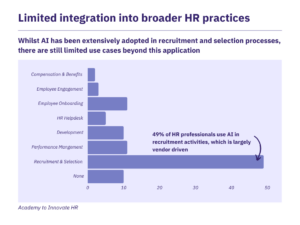 HR professionals also indicate that the HR function still struggles to effectively measure AI’s impact and return on investment (ROI). Around 60% of HR professionals have yet to active impact measurement approach. While AI tools can enhance efficiency, quantifying their direct benefits is challenging. With robust metrics and analytical frameworks, proving AI initiatives’ effectiveness is simple, making it easier for HR to build a compelling business case for broader AI adoption.
HR professionals also indicate that the HR function still struggles to effectively measure AI’s impact and return on investment (ROI). Around 60% of HR professionals have yet to active impact measurement approach. While AI tools can enhance efficiency, quantifying their direct benefits is challenging. With robust metrics and analytical frameworks, proving AI initiatives’ effectiveness is simple, making it easier for HR to build a compelling business case for broader AI adoption.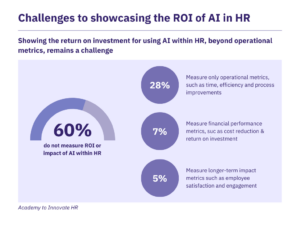 Barriers to AI Adoption in HR
Barriers to AI Adoption in HR
There still needs to be a significant gap in competence and confidence in using AI effectively, with only 36% of HR professionals feeling adequately equipped to use these tools. Many HR professionals need more understanding or expertise in AI technologies, which significantly hinders their ability to make informed decisions. 6 This knowledge gap creates a substantial barrier to adoption, as professionals hesitate to fully implement AI solutions they need to understand.
Without a solid grasp of AI capabilities and limitations, HR departments struggle to envision how these technologies can be seamlessly integrated into their existing processes. This uncertainty is a significant obstacle, leading to a cautious approach that delays the adoption of potentially transformative tools.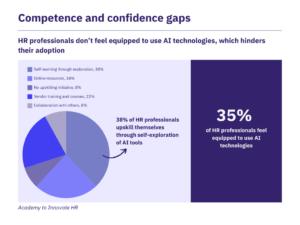 Another significant challenge is the adequacy of AI user training. Current training methods, which typically rely on vendor-led sessions or self-directed learning, often fall short of addressing HR professionals’ diverse needs and contexts. These methods may provide a basic understanding of AI tools. Still, they must equip HR teams with the confidence and competence to use these technologies effectively in their work environments. The lack of comprehensive, context-specific training means many HR professionals feel ill-prepared to leverage AI tools to their full potential.
Another significant challenge is the adequacy of AI user training. Current training methods, which typically rely on vendor-led sessions or self-directed learning, often fall short of addressing HR professionals’ diverse needs and contexts. These methods may provide a basic understanding of AI tools. Still, they must equip HR teams with the confidence and competence to use these technologies effectively in their work environments. The lack of comprehensive, context-specific training means many HR professionals feel ill-prepared to leverage AI tools to their full potential.
Data privacy concerns further compound the need for more confidence in using AI. HR professionals are understandably worried about how AI systems handle sensitive employee information. The fear of potential data breaches or misuse of information exacerbates their reluctance to embrace AI technologies. For HR departments, the priority is always to safeguard sensitive data, often overshadowing the potential benefits that AI could bring.7 This cautious stance is reinforced by high-profile incidents of data breaches in other sectors, making HR professionals wary of introducing new vulnerabilities through AI systems.
Four Personas Shaping Adoption of AI in HR
Our data reveals that AI adoption in HR is heavily influenced by the use and integration of AI into HR practices and processes and the extent to which AI is viewed positively. These two factors impact the underlying behaviors of HR professionals, impacting the importance of AI adoption and how AI is integrated into their daily work.
Based on this insight, we classify HR professionals into four distinct adoption personas. These personas highlight the groups’ shared behaviors and motivators when adopting AI and enable us to define targeted actions for accelerated adoption in the future.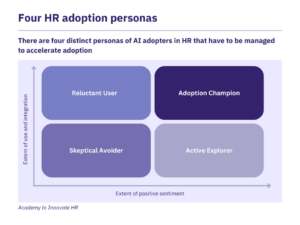 The Skeptical Avoider
The Skeptical Avoider
These users do not actively use AI in their day-to-day activities, AI is not integrated into their HR practices, and they do not perceive AI as valuable or necessary. This results in little motivation to upskill themselves or prepare for AI adoption and a generally negative or indifferent attitude towards AI in HR.
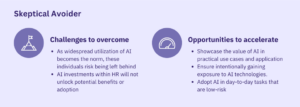 The Reluctant User
The Reluctant User
Reluctant users are often in environments where AI is actively used or integrated. Their day-to-day HR processes involve AI but need more participation in using it. Their reluctance to use AI stems from various factors, like a need for understanding, budgetary constraints, or integration issues. As a result, their learning approach is mostly self-exploration or relying on tech teams.
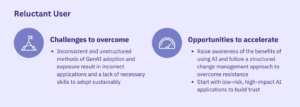 The Active Explorer
The Active Explorer
These users use AI in limited capacities, primarily for content creation, research, and task automation. Although they recognize the potential benefits, their opportunities to experiment with these technologies are constrained, typically not extending beyond individual productivity enhancements. They operate in environments with limited investment in AI, resulting in minimal structured adoption. Consequently, these users rely heavily on self-learning through exploration and online resources.
 The Adoption Champion
The Adoption Champion
These users extensively use AI across various HR practices and for individual productivity, reporting tangible benefits such as increased efficiency, time savings, and improved decision-making. Operating in environments with significant investment in AI, these users view the technology as a strategic driver and are keen on experimentation. They actively engage in formal training through courses, vendor programs, and collaboration with tech teams, fostering a positive sentiment towards AI and enabling a focus on strategic tasks.
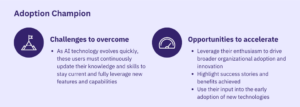
Strategies to Accelerate AI Adoption Across the Four Personas
HR must take deliberate and strategic steps to harness AI’s advantages, considering the challenges and opportunities across all four personas.
We have outlined four essential actions HR leaders should consider integrating AI into their processes and maximize its potential successfully.
- Clearly define AI use cases.
Identify HR processes where AI adds the most value, such as recruitment, employee engagement, and learning and development. Identify low-risk use cases that allow HR team members to experiment and build their confidence in a safe environment.
- Establish AI guardrails
Implement guidelines to mitigate AI adoption risks, ensuring data privacy and security.8 Develop ethical standards for AI usage, focusing on transparency and fairness. Regularly review and update these guidelines to address emerging challenges and maintain AI system integrity, building trust in the technology.
- Embrace experimentation and continuous improvement
Foster a culture of experimentation and continuous improvement by initiating pilot projects to test AI tools on a small scale. Gather feedback, analyze performance data, and refine AI strategies based on insights. Encourage agility and adaptability to ensure AI solutions remain effective and aligned with organizational goals.
- Upskill and integrate
Evaluate knowledge and skill gaps within the HR team and provide upskilling opportunities on AI concepts and tools.9 Promote curiosity and openness to learning, encouraging exploration of new technologies without fear of failure.
Final Words
AI and Gen AI hold immense promise for the future of HR, offering innovative solutions and transformative potential to revolutionize HR. However, to realize this future, it is crucial to address the existing obstacles and ensure that HR professionals can fully embrace and integrate AI into their practices in the future.
Endnotes
1 https://bit.ly/3WW0BX9
2 https://bit.ly/3WW7t6W
3 https://bit.ly/3LWSTpl
4 https://bit.ly/3LVQ0VM
5 https://bit.ly/3WAZued
6 https://bit.ly/3WVmbuN
7 https://bit.ly/3ywEDRa
8 https://bit.ly/3YE26L4
9 https://bit.ly/4dae978


